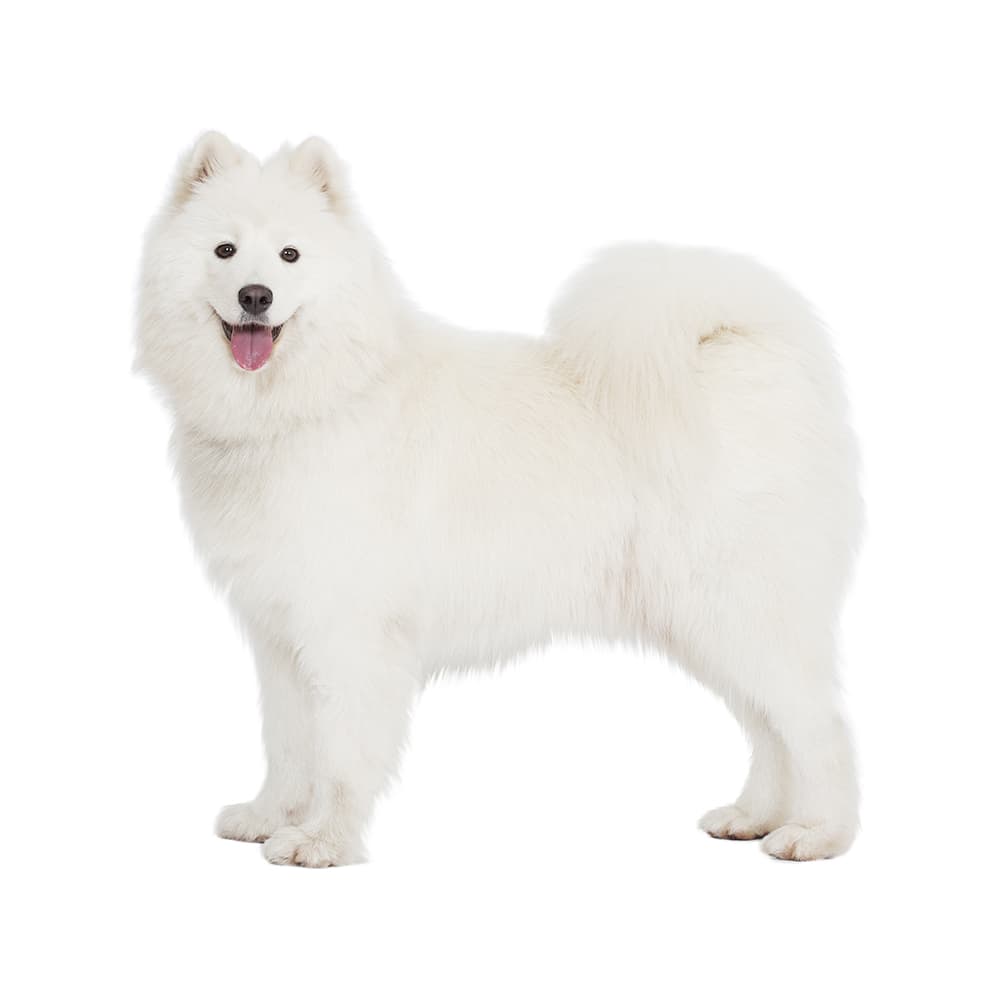Discover your dog's connection to this breed and 200+ others


Discover your dog's connection to this breed and 200+ others



The Samoyed is a large breed of herding dog that originated from the Siberian region of Russia. The breed is named after the Samoyedic peoples of Siberia who used these dogs for a variety of tasks including herding reindeer, pulling sleds, and keeping their owners warm on cold nights. They are sometimes also referred to as Smiling Sammies due to their characteristic grin which is thought to have developed to prevent icicles from forming on the dog's face in extreme cold conditions. The breed has a long history, dating back thousands of years. The Samoyedic people, a group of semi-nomadic tribes from northern Siberia, bred these dogs to help with their way of life. Samoyeds were multi-purpose animals, providing their owners with transportation, companionship, and assistance with herding. They were highly valued and often shared living quarters with their owners. In the late 19th and early 20th centuries, explorers utilized Samoyeds for polar expeditions due to their endurance and resilience in harsh weather conditions. This exposed the breed to Western countries, where they began to gain popularity.
Samoyeds are known for their friendly and gentle nature. They are excellent family dogs and usually get along well with children and other dogs. They are intelligent and can be trained, but can sometimes be stubborn. As they were bred for hard work in cold conditions, Samoyeds have a lot of energy and need regular exercise.
They are also known to be quite vocal, expressing themselves with barks, howls, and "talking" sounds. Despite their working heritage, they are not known to be good guard dogs as they tend to be friendly towards strangers.
Samoyeds are known for their friendly and gentle nature. They are excellent family dogs and usually get along well with children and other dogs. They are intelligent and can be trained, but can sometimes be stubborn. As they were bred for hard work in cold conditions, Samoyeds have a lot of energy and need regular exercise.
They are also known to be quite vocal, expressing themselves with barks, howls, and "talking" sounds. Despite their working heritage, they are not known to be good guard dogs as they tend to be friendly towards strangers.
A canine genetic lineage is a group of individuals or entire breeds that descended from common ancestors predating modern breed formation. Often these lineages are associated with a ‘type’ of dog with a unique historical working role and associated behaviors (e.g., herding, scent hunting, etc.).
Spitz and Sled Dogs originate in the Arctic and subarctic regions which caused them the develop adaptations to cold climates. Some of these adaptations give rise to characteristics of the lineage, most notably a dense double coat that helps with insulation. The lineage of these dogs can be followed back to ancient breeds developed by Indigenous people. These ancient breeds were used as an aid for transportation, herding, guarding, and hunting. These jobs have created dogs that are independent, intelligent and have strong work ethics as well as a sturdy body that helps them to pull sleds or go on long journeys over rough terrain.
Example breeds with ancestry from this lineage include Akita, Chow Chow, and Siberian Husky.
Samoyed fur is so warm and dense that it was once used to make clothing and blankets.
Their "Sammy smile" serves a functional purpose: the upturned corners of their mouth prevent drooling, which could form ice on their faces in their original cold climates.
The fur of the Samoyed dog is so hypoallergenic that it is even used in weaving a type of textile known as "Samoyed Silk".
Roald Amundsen took Samoyeds with him on his landmark journey to the South Pole in 1911.
Samoyed have been used as a companion to or guard dog of reindeer.
https://www.akc.org/dog-breeds/samoyed/
https://www.hillspet.com/dog-care/dog-breeds/samoyed
https://vgl.ucdavis.edu/breed/samoyed
https://www.fci.be/en/nomenclature/SAMOYED-212.html
https://www.ukcdogs.com/samoyed
Recommended by top vets with decades of experience
21 breeds
64 genetic health markers
50 genetic trait markers
